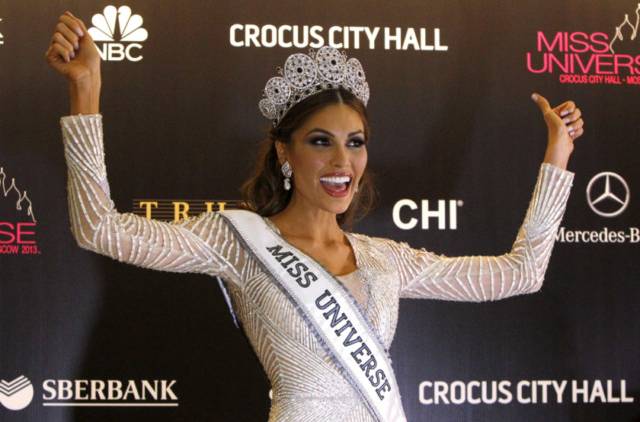
Image Credit: Gulfnews.com
There are some things that even I, in all of my high-minded preachiess, feel squeamish about approaching. The gender studies climate in my field has been influenced by critics who laud the values of embracing “girl culture,” celebrating personal gender choices, and moving away from blaming an insidious patriarchy for indoctrinating women. However, I can't help but notice that social and economic inequality still haunt gender divides, and, politically speaking, it might be responsible to keep harping on glass ceilings and body image issues until everyone acknowledges that sexism, like racism, is still a “thing” in American culture. How does one properly balance these two positions? I struggle with this question constantly. Take the Miss Universe pageant, for example.
Casually flipping through images of contestants on the internet confirmed my assumption that “beautiful” women are still expected to be remarkably thin. Fears of inspiring anorexia in young women aside, the very notion that individuals can, and implicitly should, compete to be declared gorgeous makes me antsy. Doesn't this unfortunately suggest that there's one, and only one, proper way to be beautiful? I don't think there's an event that pits different genres of music against each other or judges various schools of painting using one set scale. Subjective taste and context come into the equation somewhere, and we seem to respect that in many cases. Why haven't we reached a point where different body types and face shapes can be appreciated for their uniqueness instead of put into direct competition? In case I'm starting to sound a little too idealistic, I'll admit that highly publicized beauty pageants do at least promise to offer avenues for national pride, individual excellence, and perhaps even social change. Titi Yitayish Ayanaw is the first black Miss Isreal. Miss Bulgaria Veneta Krasteva is currently in remission for breast cancer and uses her title to raise awareness about the disease. In 2012, Jenna Talackova became the first transgender woman to compete in a Miss Universe Canada pageant. Do these landmark women signal social change? Should we celebrate their achievements or remain concerned over their adherence to specific beauty standards?
Larger social concerns aside, what about respecting a woman's decision to actively pursue pageant titles? After all, feminist movements have emphasized a woman's right to do what she pleases with her body. Can beauty pageant contestants be chastised for doing just that? To further complicate the issue, aren't all cultural standards for excellence as arbitrary as beauty, anyway? Shouldn't individuals be able to decide where they want to try to shine? For example, I certainly wouldn't win any community service awards, but I do try to keep my friends entertained with tomfoolery. If I had grown into a tall, slim stunner I would probably be irked at critics who wanted to impress upon me the “subjugation” of women upheld by beauty pageants.
There are certainly conversations to be had about the social implications of beauty pageants, with decent points on various sides, but I will firmly declare that some of the requirements for competing to become Miss Universe are absolutely, 100% ridiculous. According to the Miss Universe FAQ page, contestants must be between 18 and 27, because we all know that women simply stop being attractive when they hit 28, right? They also can't be married, can't ever have been married, can't be pregnant and can't have children. I'm so confused about the message here. Isn't the point of the Miss Universe pageant to award physical excellence? If so, then why all these restrictive requirements? Why the emphasis on being single? On not being a mother? Arbitrary standards of beauty are one thing, and they definitely deserve discussion, but I can't even come up with a hypothetical scenario to defend arbitrary requirements for even being considered visually gorgeous.
Comments
Great questions
I really enjoyed seeing you talk about aspects of feminist studies that do seem less "popular" now. In addition, I would love to see more about Miss Universe itself - your last paragraph on the requirements was rididculous! Is there a purity aspect to this beauty? Being pure of placenta and even of divorce? Why not give these women virginity tests, too? (obviously, I'm being sarcastic). This post definitely makes me want to know more about Miss Universe - and also, to compare it to the very different Mr. Universe competition (notice, it's never called a pageant).